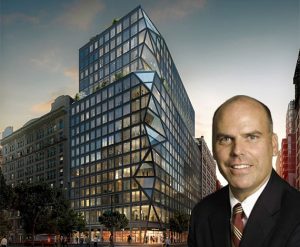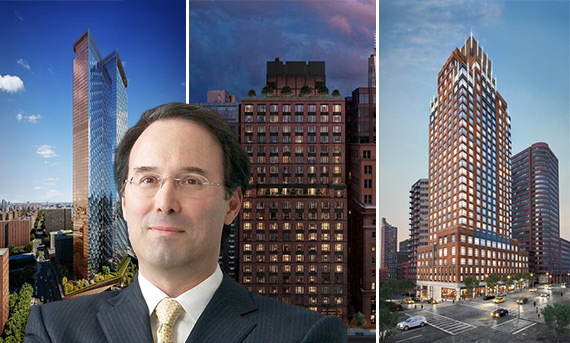With its undulating glass facade, 252 East 57th Street was among the marquee new developments that promised to reshape Midtown East back when it debuted in late 2014. But after an extended period of sluggish sales – just under half the condominium’s 95 units remain unsold – the developers decided it was time to take drastic measures.
On top of price cuts last year, World Wide Group and Rose Associates are now offering brokers a 4 percent commission, including 1 percent that’s non-refundable and will be paid as soon as a contract is inked.
“We were trying to think outside the box in terms of what would set us apart,” said Stribling’s Pamela D’Arc, who is marketing the condos. “People come down 57th Street and I think they literally go from one end to the other.”
Discounts have been part of the high-end condo market’s story for many months now, but price slashing is not the only way developers are trying to hook buyers. Faced with stiff competition from a heap of new luxury product on the market, developers are paying transfer taxes, offering discounts, dangling gifts cards and other sweeteners in front of brokers and buyers.
It’s all about getting deals done as quickly as possible.
“They don’t want to give off the perception that they’re lowering prices, so they may offer a concession,” said Douglas Elliman’s Vickey Barron. For buildings with unsold inventory, offering incentives can be an easy way to move sales along, she said.
“They’re not wrong for doing it,” Barron added. “You don’t want to be sitting with empty apartments.”
Developers whose construction loans are coming due have the most on the line, and are anxious to stave off lenders anxious about getting paid back.
“The pressure on developers is starting,” said one marketing executive. “I’ve been getting calls from banks asking what the larger units will rent for.”
Slow and soft
It’s taking longer to sell new condos these days as high-priced units planned during 2014 and 2015 flood the market. New development sales dropped 13.2 percent year-over-year to 479 units during the fourth quarter, according to appraisal firm Miller Samuel. Meanwhile, the average number of days on the market jumped 20.7 percent to 181 during that time.
[vision_pullquote style=”3″ align=””] “People come down 57th Street and I think they literally go from one end to the other.” [/vision_pullquote] In recent months, the slowdown has spooked a handful of developers, notably CL Investment, which scrapped its $300 million luxury condo conversion at 287 Park Avenue South this fall. In February, the Chinese investment firm also sold its 32.9 percent stake in Coda, Magnum Real Estate Group’s rental-to-condo conversion at 385 First Avenue.
Kuafu Properties hit pause on its major development at 161 East 60th Street, a $300 million site now controlled by ex-Kuafu principal Denis Shan, while JDS Development Group and Property Markets Group suspended sales at 111 West 57th Street last year. At the time, PMG’s Kevin Maloney preached the value of waiting until the market improved.
In instances where waiting isn’t an option, buyers are calling the shots, he recently observed.
“The next two years will be the year of the deal,” Maloney told Bloomberg this fall. “If you have cash, I can’t imagine there’s not a condo project that’s coming out of the ground where you can’t walk into the sales office and say ‘This is the deal I’m willing to offer.’”
And while the terms of those deals may not be ideal, many developers aren’t in the position to call the shots.
“In a strong market we would say no — in a soft market like now, we would consider it.” said Elliman’s Richard Steinberg, who is marketing the Chamberlain, Simon Baron Development and Quadrum Global’s 39-unit condop at 269 West 87th Street. He said buyers always try to push the closing costs, transfer taxes and mansion taxes onto developers — that’s the name of the game. The difference is, in a market like this one, they’re more likely to be successful.
“At the end of the day, it’s what is net to the developer,” Steinberg said. “So if it’s a higher offer, and they want us to pay closing costs, of course we would do it.”
Just the tax
While many developers stay mum about offering concessions, others talk them up as a marketing tool.
Last month, Toll Brothers City Living offered to pay the transfer and mansion taxes for any buyer who went into contract at select buildings before Feb. 26. Billed as a part of the company’s “national sales event,” the offer was good at 55 West 17th Street, 100 Barrow Street and the Sutton at 959 First Avenue.

121 East 22nd Street and Doug Yearley
“We have, in certain locations, had increased incentives to sell,” Toll Brothers CEO Douglas Yearley said during a Feb. 22 earnings call. “But even with those increases in incentives, our gross margins have far exceeded the company average.” He said while the company was proceeding with caution in the market, it was “well-positioned to absorb what has been going on in New York City.”
Still, Toll Brothers is one of very few developers who have made across-the-board offers. It’s far more common for sponsors to take a building-by-building — and deal-by-deal — approach to sales.
“Each developer is in his own situation with his own project,” said Magnum’s Ben Shaoul, who said he’s willing to pay transfer and mansion taxes at 100 Barclay — where sales launched in 2015 and prices average $2,254 per square foot, according to StreetEasy — but wasn’t extending the same offer at 196 Orchard Street, which hit the market a year later and is asking $2,324 per square foot, on average. “To generalize about the market is naive and ridiculous,” he said.
Most buyers nowadays are trying to save a buck where they can. “If you are a buyer at over $10 million, you will be asking for concessions,” said one top broker, who requested anonymity.
Compass’ Leonard Steinberg said, “Correctly priced properties in prime locations that are beautifully executed, mostly don’t require additional incentives to sell. But right now, there is a bit of a race to drive concessions.”
For example, Jody Kriss’ East River Partners is offering tax concessions for a “limited time” at its condo developments at 164 South Oxford Street and 171 South Portland Avenue in Fort Greene. MNS’ Andrew Barrocas, who is marketing the projects, said the sweeteners helps sales velocity, and that the developer was only offering them until the end of March.
[vision_pullquote style=”3″ align=””] “Extell’s commission deal shook the market.” [/vision_pullquote]The savings, particularly on luxury apartments, can be significant. For a $10 million property, mansion and transfer taxes — which come to about 2.5 percent — can set a buyer back $250,000. Watching who foots the bill for attorney’s fees, which can run another several thousand dollars, are another way to take the temperature of the market: When things are red-hot, buyers sign those checks, but when sales are sluggish, sponsors may absorb those costs.
“Particularly in the over $2,000-a-foot market, developers are more likely to negotiate on some of the costs,” said Alvin Schein, a partner at law firm Seiden & Schein, who has worked with Toll Brothers, Madison Equities, Magnum and Extell on various projects.
The Bentley club
But developers aren’t just luring buyers by agreeing to pick up the tab on the added extras. In some cases they’ll agree to make design modifications if it will get a buyer over the line.
Others are trying more outlandish stunts. Wonder Works Construction and Girona Ventures, the developers of a townhouse at 357 West 17th Street asking $36.8 million, are throwing in a Bentley worth at least $200,000. And at the Nevins, a new condo in Boerum Hill that hit the market six months ago, the developers offered gift cards to brokers and buyers during the holiday season if they signed a contract by the first week in January. (They offered $2,000 for one-bedrooms, $3,000 for two-beds and $4,000 for three-bedroom units.) “We didn’t want to lose momentum,” said the Corcoran Group’s Tamir Shemesh, who is marketing the 73-unit project for developers Naveh Shuster Group and Adam America Real Estate. Shemesh said the building is nearly 70 percent in contract, but, “you can’t sell a project at the same pace that you sell in the beginning, so when you see the potential for slowdown, you boost it up.”
Some developers prefer to spend their dollars on agents who can bring in buyers. Earlier this month, Extell took the unusual step of offering brokers a 50 percent commission advance on sales at properties now under construction — including One Manhattan Square, 70 Charlton and the Kent.
“Extell’s commission deal shook the market.” said one broker. “We’re going to see more and more of it — particularly in the Midtown corridor where there is a glut of product.”
Gale International, which is trying to sell the last penthouse 21 West 20th Street , is taking a similar approach, wooing brokers with an unusually high commission of five percent.
“Offering a higher commission does not sell an apartment, but what it does is attract the attention of the brokerage community,” said Stan Gale Jr., president of the firm. “Everyone knows that there’s a lot of product out there, people need to differentiate.” He declined to comment on whether the firm would offer concessions in the form of paying closing costs. Toll Brothers City Living is also offering a portfolio-wide commission incentive.
But in some cases, the only way to sell is to cut prices.
“Developers are not only offering to cover closing costs, but are breaking the final barrier — pricing,” said Martin Eiden, a broker at CORE. “The reduction in pricing not only affects people who bought in the building and are trying to resell, but neighboring properties.”
In January, for example, Extell cut the prices of five apartments at Carlton House by 10 percent. “We’ve priced to account for today’s market,” Barnett recently told the Wall Street Journal. “The market wants to see some discounting.”

From left: Gary Barnett, One Manhattan Square, 70 Charlton Street and the Kent
Others are going a lot further, finally facing the music about what their product is worth.
DHA Capital and Continental Properties’ triplex penthouse at 12 East 13th Street was once asking as much as $30 million. But sitting without a suitor for three-and-a-half years, it’s now all the way down to $16 million.
“It’s a very different market now,” said Compass’ Herve Senequier, who is marketing the pad. “Most properties above $15 million have received pricing adjustments, and the price now makes more sense.”

